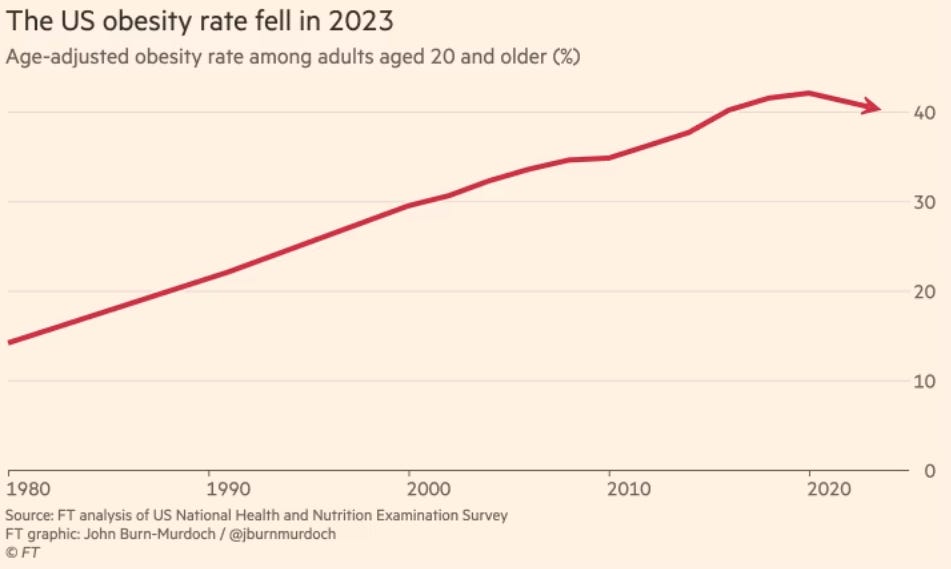Highlights in this issue:
founder profiles
defense tech
peak obesity
legacy admissions
Good reading,
—TK
If you were forwarded this email, subscribe here.
⚕️ After decades of rising, the US obesity rate may have peaked in 2023 thanks to Ozempic
What makes this all the more remarkable is the contrast in mechanisms behind the respective declines in smoking and obesity. The former was eventually achieved through decades of campaigning, public health warnings, tax incentives and bans. With obesity, a single pharmaceutical innovation has done what those same methods have repeatedly failed to do…
In America and beyond, the dividends will be enormous. After smoking rates began falling, rates of lung cancer promptly peaked and then dropped precipitously, saving millions of lives. If obesity curves do now descend, rates of cardiometabolic disease and death should follow. More promising still, a growing number of trials find the addiction-suppressing mechanism of the same drugs can also reduce rates of alcohol misuse and even avert opioid overdoses.
🛠 Recent founder profiles—Alex Karp of Palantir and Alexandr Wang of Scale—are just another sign of the American Dynamism movement in tech/VC, and a sign of some defense tech PR firm working overtime. (There was also a great one about Palmer Luckey of Anduril that I’ll highlight next issue. In the meantime, enjoy this awesome video of Luckey calling out one of his critics, Jason Calacanis, to his face at Jason’s own conference.)
A common thread through the pieces is a confidence in locating their work, and their companies’ work, in an unabashedly American and Western POV. That’s not a new thing per se, but it is a contrast from two strains of “nationlessness” in tech:
not being biased towards the US, e.g. when Google dropped DoD contracts in 2018 because of employee outcry, (although maybe we haven’t come too far)1
just viewing traditional nations and states as an increasingly obsolete mental framework and ineffective practical agent, i.e. Balaji Srinivasan’s network state movement.
There’s a very self-conscious taking up of the mantle of Western civilization. Anduril, in its original Tolkien context means “Flame of the West” and Karp has some choice quotes to a similar effect:
“We have a consistently pro-Western view that the West has a superior way of living and organizing itself, especially if we live up to our aspirations,” Mr. Karp said. “It’s interesting how radical that is, considering it’s not, in my view, that radical”…
“A lot of this does come down to, do you think America is a beacon of good or not? I think a lot of the critics, what they actually believe is America is not a force for good.” His feeling is this: “Without being Pollyannaish, idiotic or pretending like any country’s been perfect or there’s not injustice, at the margin, would you want a world where America is stronger, healthy and more powerful, or not?”
The whole profile is worth reading in full because Karp seems like an incredibly eccentric person who’s totally unlike the typical tech CEO much less the CEO of a defense contractor.
One part I was curious to learn more about:
He does crow a little about Western civilization’s resting on Palantir’s slender shoulders, noting that without its software, “you would’ve had massive terror attacks in Europe already, like Oct. 7 style.” And those attacks, he believes, would have propelled the far right to power…
On the future of warfare, this is something I want to devote more time to:
Mr. Karp said that we are “very close” to terminator robots and at the threshold of “somewhat autonomous drones and devices like this being the most important instruments of war. You already see this in Ukraine.”
Karp’s social commentary:
“I don’t believe you would have a Trump phenomenon without the excesses of Silicon Valley,” he said. “Very, very wealthy people who support policies where they don’t have to absorb the cost at all. Just also the general feeling that these people are not tethered to our society, and simultaneously are becoming billionaires."
He thinks that in America and in Europe, the inability or unwillingness to secure borders fuels authoritarianism.“ I see it as pretty simple: You have an open border, you get the far right,” he said. “And once you get them, you can’t get rid of them. We saw it in Brexit, we see it with Le Pen in France, you see it across Europe. Now you see it in Germany.”
The startup world has a long history of cribbing a more aggressive and military ethos. I’m thinking of Zuckerberg’s Carthago delenda est. But now we’re seeing the spirit of “move fast and break things” go in the reverse direction. Defense tech startups that know how to build fast and cheap, are becoming increasingly important in a moment when drone combat meta is evolving weekly on the frontlines of Ukraine. The status quo where nonstate actors like the Houthis launch thousand-dollar drones we have to shoot down with million-dollar missiles, looks increasingly unsustainable.
Ares’s founders, Alex Tseng and Devan Plantamura, say their $300,000 anti-ship cruise missiles “will be 10x smaller and 10x cheaper” than today’s alternatives…
Against the backdrop of conflict in Europe and the Middle East, technology investors have ditched red lines against investment in military hardware. They have also been encouraged by the emergence of a crop of fast-growing companies that want to update America’s armoury in return for a slice of an annual defence budget of roughly $800bn.
🎓 One of the early signs of what the post-affirmative action landscape will look like, California banned legacy admissions at private colleges
California joins Colorado, Illinois, Maryland and Virginia in prohibiting legacy preference in college admissions. The effort comes as schools across the U.S. grapple with how to select their student bodies in the wake of last year’s Supreme Court decision to end affirmative action in college admissions.
We had our first non-AA class admitted and the results aren’t as dramatic as people might have expected. Harvard saw a slight decrease in Black student enrollment, slight increase in Hispanic students, and no change in Asian students. That being said, Asian enrollment percentage steadily increased at Harvard ever since the legal actions started gaining steam so I imagine we still saw the effects, just pulled forward. I wrote a bit about this last year:
☁️📀 Amidst the destruction of Hurricane Helene, one of the more random effects is its impact on the town of Spruce Pine, NC (pop. 2000) which produces 90% of the world’s ultra-pure quartz, crucial for making high-grade silicon for semiconductor manufacturing.
SemiAnalysis, a chip consultancy, estimates that silicon wafer manufacturers such as GlobalWafers, Siltronic and Sumco have between 3 to 8 months of inventories available to chipmakers such as Intel, Samsung and TSMC. “Existing inventory is a buffer” to any disruption, its analysts said, and mining activities can “probably” restart before those are run down.
There probably won’t be too big of an impact on the supply chain, but it does highlight again the danger of supply chain concentration, like when Hurricane Maria hit Puerto Rico and knocked out one of the few suppliers of IV fluids to the US.
🎬📉 US film and TV production is down 40% from where it was before the WGA/SAG strike last year
…a return to pre-strike levels is still unlikely as studios are cutting back on spending to make their streaming services profitable. For several years, the entertainment industry benefitted from an arms race among the studios as they tried to fill their fledgling streaming services with a diverse array of original films and TV shows.
💊 After 3 years, Oregon is ending its experiment in effectively legalized drug use
Because of decades of underinvestment in behavioral health services, there weren’t enough providers to care for drug users… Then there was fentanyl. Up to 50 times stronger than heroin, fentanyl in 2021 was just hitting its peak on the West Coast after wreaking havoc elsewhere in the nation.
You’ve made it all the way to the end! Thanks for reading fD. You can support my work by upgrading to premium or share the newsletter with a friend. —TK
Here’s a link to my 2024 News Journal where I'm collecting the headlines that catch my interest each day so that when we look back at that at the end of the year, we'll see when things happened, what kind of patterns emerged, without the problem of hindsight bias.
The profile on Wang doesn’t touch on this stuff as much, but he’s been outspoken about it elsewhere















📈 first Derivative [117]